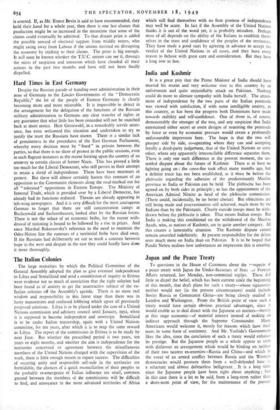The Italian Colonies
The large majorities by which the Political Committee of the General Assembly adopted the plan to give eventual independence to Libya and Somaliland and send a commission of inquiry to Eritrca were evidence not so much of conviction that the right solution had been found as of anxiety to get the unattractive subject of the ex- Italian colonies off the Assembly's agenda. There is no more real wisdom and responsibility in this latest stage than there was in hasty manoeuvres and confused lobbying which upset all previously proposed solutions. Libya is to be placed under the care of a United Nations commission and advisory council until January, 1952, when it is supposed to become independent and sovereign. Somaliland is to be under Italian trusteeship, again with a United Nations committee, for ten years, after which it is to reap the same reward as Libya. The report of the commission in Eritrca is to be ready by next June. But whether the prescribed period is two years, ten years or eight months, and whether the aim is independence for the territories concerned or agreement between the miscellaneous members of the United Nations charged with the supervision of the work, there is little enough reason to expect success. The difficulties of securing unity and responsible self-rule in the territories are formidable, the chances of a quick reconciliation of their peoples to the probable re-emergence of Italian influence are small, common ground between the members of the commissions will be difficult to find, and annoyance in the more advanced territories of Africa which still find themselves with no firm promise of independence may well be acute. In fact if the Assembly of the United Nations thinks it is out of the wood yet, it is probably mistaken. Perhaps most of all depends on the ability of the Italians to establish them- selves in the trust and confidence of the peoples of the territories. They have made a good start by agreeing in advance to accept the verdict of the United Nations in all cases, and they have every reason to behave with great care and consideration. But they have a long row to hoc.














































































 Previous page
Previous page